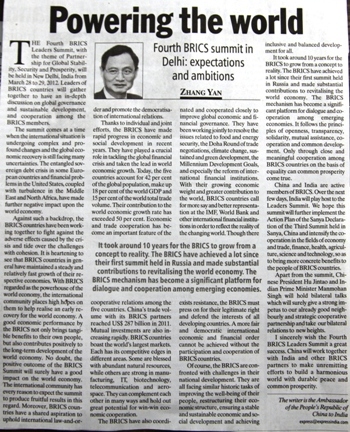|

Issued in The Indian Express, March 28, 2012
By Zhang Yan, Ambassador of the P.R. China to India
The Fourth BRICS Leaders Meeting, with the theme of Partnership for Global Stability, Security and Prosperity, will be held in New Delhi, India from March 28 to 29, 2012. Leaders of BRICS countries will gather together to have in-depth discussion on global governance and sustainable development, and cooperation among the BRICS members.
The Summit comes at a time when the international situation is undergoing complex and profound changes and the world economic recovery is still facing many uncertainties. The entangled sovereign debt crisis in some European countries and financial problems in the United States coupled with turbulence in the Middle East and North Africa have cast further negative impact upon the world economy.
Against such backdrop, the BRICS countries have been working together to fight against the adverse effects caused by the crisis and tided over the challenges with cohesion. It is heartening to see that BRICS countries in general have maintained a steady and relatively fast growth of their respective economy. With BRICS countries regarded as the powerhouse of the world economy, the international community places high hope on them to help realize an early recovery of the world economy. A good economic performance of BRICS countries not only brings tangible benefits to their own people, but also contributes positively to the long-term development of world economy. No doubt, the positive outcome of the BRICS Summit will surely have good impact on the world economy. The international community has every reason to expect the Summit to produce fruitful results in this regard. Moreover, BRICS countries have shared aspiration in upholding international law and order and promoting the democratization of the international relations.
Thanks to the individual and joint efforts, the BRICS countries have scored rapid progress in economic and social development in recent years. They have played crucial role in tackling the global financial crisis and taken the lead in world economic growth. Today, the five countries account for 42 per cent of the global population, make up 18 per cent of the world GDP and 15 per cent of the world total trade volume. Their contribution to world economic growth rate has exceeded 50 per cent. The economic and trade cooperation has become an important feature of the cooperative relations among five countries. China's trade volume with BRICS partners reached US$ 287 billion in 2011. Mutual investments are also increasing rapidly. The BRICS countries boast the world's largest markets. Each has its competitive edges in different areas. Some are blessed with abundant natural resources, while others are strong in manufacturing, IT, biotechnology, telecommunication and aerospace. They can complement each other in many ways and hold out great potentials for win-win economic cooperation.
The BRICS countries have also coordinated and cooperated closely to improve the global economic and financial governance. They have been working jointly to resolve the issues related to food and energy security, the Doha Round of trade negotiations, climate change, sustained and green development, Millennium Development Goals, and especially the reform of international financial institutions. With growing economic weight and greater contribution to the world, the BRICS countries call for more say and better representation in the IMF, World Bank and other international financial institutions in order to reflect the reality of the changing world. Though there exists resistance, the BRICS countries must press on for their legitimate right and defend the interests of all developing countries. A more fair and democratic international economic and financial order cannot be achieved without the participation and cooperation of BRICS countries.
Of course, the BRICS countries are confronted with challenges in their national development. They are all facing similar historic tasks of improving the wellbeing of their people, restructuring their economic structure, ensuring a stable and sustainable economic and social development and achieving an inclusive and balanced development for all.
It took around ten years for BRICS to grow from a concept to reality. BRICS has achieved a lot since its first summit held in Russia and made substantial contributions to revitalizing world economy. BRICS mechanism has become a significant platform for dialogue and cooperation among emerging economies. It follows the principles of openness, transparency, solidarity, mutual assistance, cooperation and common development. Only through close and meaningful cooperation among the BRICS countries on the basis of equality could common prosperity come true.
China and India are active members of BRICS. In next few days, India will play the host of the Leaders Meeting. We hope this Summit will further implement the Action Plan of the Sanya Declaration of the Third Summit held in Sanya, China and intensify the cooperation in the fields of economic and trade, finance, health, agriculture, science and technology, so as to bring more concrete benefit to the people of BRICS countries.
Apart from the Summit, Chinese President Hu Jintao and Indian Prime Minister Dr. Manmohan Singh will hold bilateral talks which will surely give a strong impetus to our already good neighborly and strategic cooperative partnership and bring our bilateral relations to a new height.
I sincerely wish the Fourth BRICS Leaders Meeting a great success. China will work together with India and other BRICS partners to make unremitting efforts to build a harmonious world with durable peace and common prosperity.
|